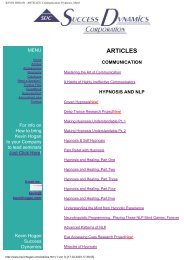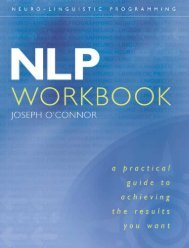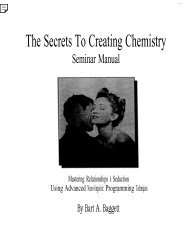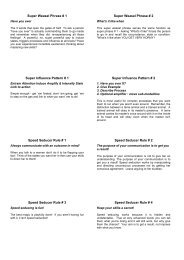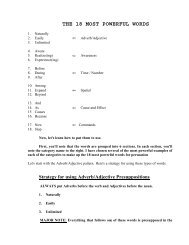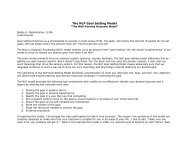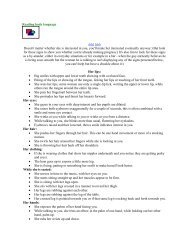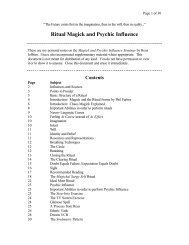A Pragmatic Guide To Communication & Change.pdf - NLP Info Centre
A Pragmatic Guide To Communication & Change.pdf - NLP Info Centre
A Pragmatic Guide To Communication & Change.pdf - NLP Info Centre
- No tags were found...
You also want an ePaper? Increase the reach of your titles
YUMPU automatically turns print PDFs into web optimized ePapers that Google loves.
A person's preferred representational system may influence many aspects of his life,<br />
including his choice of careers. It may even be that the language patterns associated with<br />
the preferred system are a significant part of the job itself. The following is an example of<br />
this generalization.<br />
If you have ever listened to two lawyers arguing a case, you may have noticed some<br />
specific linguistic patterns. One very common means of expression is the deletion of<br />
themselves (deleted referential index) from the conversations and replacing the "spaces"<br />
with<br />
can be! I tell you, I'm just tired of having all this responsibility shoved in my<br />
face...<br />
There are two easy ways to determine whether or not a word is a nominalization. One<br />
way is to say the phrase: "An ongoing -" in your head, filling in the blank with the<br />
suspected noun. If the phrase makes sense, then it is a nominalization. Using the first<br />
underlined word in the above excerrt, the phrase "An ongoing relationship" makes sense.<br />
The word "relationship" is a nominalization. If we use the word "desk," as in the phrase<br />
"An ongoing desk, "the phrase doesn't make sense. The noun "desk" is not a nominalization.<br />
The second way to determine if a noun is a nominalization involves visualizing a<br />
wheelbarrow. It is easy to imagine placing a noun like "desk," "person," or "apple" into<br />
this imaginary wheelbarrow. These are all concrete nouns. Nominalizations, however,<br />
don't "fit" in our imaginary wheelbarrow. This is because they are distorted forms of<br />
verbs called abstract nouns. From the example above, they are the words "relationship,"<br />
"obligations," "pain," and "responsibility."<br />
When responding to a nominalization, it is important to assist the speaker in<br />
reconnecting with his experience so that he recognizes the role he plays in the process<br />
involved. By changing the noun back into a verb with its actively participating elements,<br />
you assist the speaker in understanding his roll as an active participant. This enables him<br />
to more easily perceive his full range of choices and the control he can exercise.<br />
In dealing with the "nominalized" client from above, the following responses could<br />
effectively be utilized:<br />
Speaker: "It's just that this darned relationship isn't working out."<br />
Response: "flow is the way you are relating not working out for you?" (Here, the<br />
nominalization is changed back into a process word, or verb, and is used to ask<br />
for the missing information - see "unspecified verbs.")<br />
Speaker: "...1 can't do anything without it being there to remind me of my<br />
obligations...."<br />
Response: "'f'o whom are you obligated to (to what?"<br />
Speaker: "...you know what a pain they can be."<br />
Response: "How do you experience that pain?" (Here, in order to answer the question, the<br />
speaker must change the nominalization back into the process-verb. Again, if his<br />
answer does not give you sufficient information, simply ask for the deleted material<br />
as demonstrated in the section an unspecified verbs.)<br />
Speaker: "I'm just tired of having responsibility shoved in my face." Response:<br />
"What do you mean 'responsibility?' "<br />
Denominalizing the Medical Model



